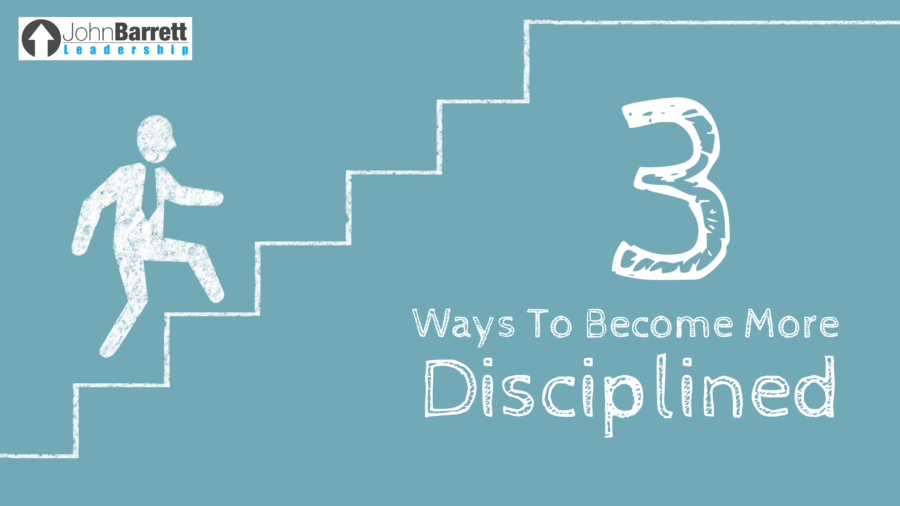3 Ways To Become More Disciplined
It’s not what we don’t know that holds us back; it’s what we know but don’t do that holds us back. The greatest gap we will ever face in life is between knowing and doing. It is what separates the Do-ers from the Don’t-ers. It is what keeps people from experiencing breakthroughs in their lives. It is the great divide that very few can bridge. Everyone knows how to lose weight, but how many actually do what is necessary to eat right and exercise? Everyone knows how to save money, but how many deny themselves immediate gratification for future opportunities? Everyone knows how to be more courageous, but how many step out of their comfort zones? The key characteristic of those who successfully bridge the divide between knowing and doing is discipline.
Discipline is the bridge between what you know and where you want to go. So here is our working definition of discipline: Discipline is the means by which you get what you really want, even when you don’t want to do the thing necessary to get it.
Do not be plagued by the Law of Diminishing Intent, which says, “The longer you wait to do something you should do now, the greater the odds are you will never actually do it.” Zig Ziglar looked at it this way: “If you do what you need to do when you need to do it, then the day will come when you can do what you want to do when you want to do it.” Discipline requires willpower. And willpower is a muscle; the more you use it, the bigger it gets.
Charles Duhigg, the author of The Power of Habit, extensively researched how having the willpower to change one keystone habit can affect all our other habits. Duhigg said, “As people strengthened their willpower muscles in one part of their lives—in the gym, or a money management program—that strength spilled over into what they ate or how hard they worked. Once willpower became stronger, it touched everything.” The results show that the more you use your willpower to change your outcome, the more it will affect every area of your life for the good.
Your level of discipline will grow when these three things are happening in your life:
1) Your WHY Is Greater Than Your WHY NOT
If you want to be disciplined, you have to have a strong why. We only modify our behavior when the pain of staying the same is greater than the pain of changing. When your why is compelling, it creates a pathway of discipline. We only change our behavior when our fundamental belief about our behavior changes. The benefit of changing must surpass the comfort of staying. Discipline is hard. I read a meme on Facebook the other day that stated: “Losing weight is hard, being overweight is hard…choose your hard.” Being intentional is not an easy feat, but the payoff is enormous.
2) Your FIFO Is Greater Than Your FOMO
FOMO (Fear Of Missing Out) is a cultural buzzword of the day. Our society is plagued with people who feel like they are on the outside looking in. With everyone posting highlight reels of their best moments on social media, many are becoming unnecessarily discouraged as they compare their real, everyday lives with the glorified highlights of others. FOMO can cause people to make rash decisions in their quest to live like the Joneses. Coveting what they see in others’ lives leads them to run after things they were never meant to have. It can also cause them to stop dead in their tracks, caught in the trap of comparison, leaving them with feelings of worthlessness and hopelessness. In either case, FOMO is an anxiety-inducing stressor that leads to poor decision-making.
Rather than suffering from FOMO, people need to be guided by what I call “FIFO”: Faith In Future Opportunities. You activate self-discipline when you believe there is something better in the future than what you are experiencing in the present. People with a strong sense of FIFO will pay now in order to play later. They see the future with optimism and hope.
3) Your COMMITMENT Is Greater Than Your CIRCUMSTANCE
Inner commitments create external guardrails. Your core values act as a rudder for your decisions. When you pre-commit to a specific behavior, it is much easier to discipline yourself to follow through in the moment. Being prepared for what lies ahead empowers you to succeed when you get there. I like how boxer Joe Frazier put it: “You can map out a fight plan or a life plan, but when the action starts, it may not go the way you planned, and you’re down to your reflexes—that means your preparation. That’s where your road-work shows. If you cheated on that in the dark of the morning, well, you’re going to get found out now, under the bright lights.”
The secret to making good choices is to make the choice before you have to make the choice. Commitment on the front end helps you follow through on the back end.









